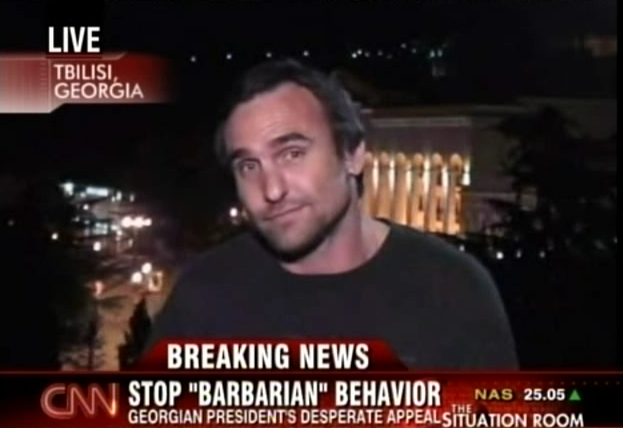TSR: "The conflict here...has a lot more to do with the Unites States..."

Length: 4:55
LARGE (57.4 MB) ----- SMALL (6.0 MB)
2 a.m. in Tbilisi. Michael explains that the Russians are sending a clear message not only to the US but also to our allies -- because our military is already stretched so thin, we are in no position to come to the aid of anyone, regardless of our committments.
SUZANNE MALVEAUX, CNN ANCHOR: A desperate new appeal by the president of Georgia to stop what he calls barbarian behavior by Russia. He estimates Russian soldiers control about one-third of his country.
Welcome to our viewers in the United States and around the world.
Georgian officials say Russian troops pushed deeper into the former Soviet republic today, even as Moscow was promising to retreat from the city of Gori by day's end. Secretary of State Condoleezza Rice repeated her call for Russia to honor its cease-fire pledge. She spoke in France before she heads to the Georgian capital, Tbilisi. The United Nations now says almost 115,000 people have been uprooted by the fighting in Georgia.
We are getting reports of utter devastation in some areas.
CNN's Michael Ware is on the ground in Georgia.
And, Michael, what are you seeing from your vantage point?
MICHAEL WARE, CNN CORRESPONDENT: Well, Suzanne, to put it simply, what I'm seeing, having visited at least one of the front lines this afternoon, is that Russia is firmly in the box seat.
This conflict here in Georgia has a lot more to do with the United States than folks back home actually realize. This is very much Russia flexing its muscle here in this region, sending a signal, not just to Georgia, which was a former satellite state within the Soviet Union, now firmly pro-American, that it cannot rely upon its American sponsor, as a message to be sent throughout this area to other countries. We're looking at the expansion of NATO, Americans sponsoring and aiding states within this region who were once aligned with the former Soviet Union, and Russia now using this opportunity, taking its moment when it sees the U.S. unable to respond, with its military already overstretched in Iraq and Afghanistan.
So, this is the time when Russia is pressing its advantage. It launched a two-pronged offensive across two fronts here in Georgia, moving in to secure two pro-Russian enclaves, which it did quite rapidly. But they did not stop there.
They have pushed deeper into truly sovereign Georgian territory. And I can tell you that, where I was this afternoon, on the outskirts of the Georgian city of Gori, the Russian troops were firmly and comfortably in control, under no threat from the ragtag columns of Georgian troops who are desperately rallying after the original offensive along the highway that's now open to the Russians towards the capital Tbilisi.
Also, the Russians having secured the other pro-Russian enclave in the West have now secured the Georgian port town of Poti. And we heard earlier this evening of a column of perhaps 100 Russian armored vehicles moving south to help troops already in that port town.
MALVEAUX: Now, Michael...
WARE: So, the Russians have made their push. They have gone deeper into Georgian territory. And they're consolidating it. And there's nothing America can do to stop them -- Suzanne.
MALVEAUX: Michael, I just spoke with the president of Georgia. And he said that he thought that perhaps not all of this was done by the Russian military themselves, but that this was creating an opening for kind of these rogue players or hoodlums to come by and loot and destroy property.
Can you make any distinction between whether or not this is the Russian military or whether or not there are some other elements now that are causing havoc?
WARE: Well, this is a very complicated issue.
And Russia's playing a very delicate hand here. What you need to understand is some of the history here, that this is not the beginning of this conflict. This conflict's been going on for more than a decade. In these two pro-Russian enclaves, there's been pro-Russian separatist guerrillas who have been in an on-again/off-again slow-burn conflict with the Georgian government here.
Now, last week, the Georgian government pushed into one of these enclaves after a particularly fierce artillery barrage from one of the pro-Russian guerrilla groups. So, what we see here is that the Russian military itself is here, the conventional regular forces. But there's also separatist, paramilitary militias.
And who is doing the damage? No one can tell at this stage. But the paramilitaries certainly give the Russian military plausible deniability -- Suzanne.
MALVEAUX: All right, Michael Ware, thank you so much for updating us on the situation on the ground there.
